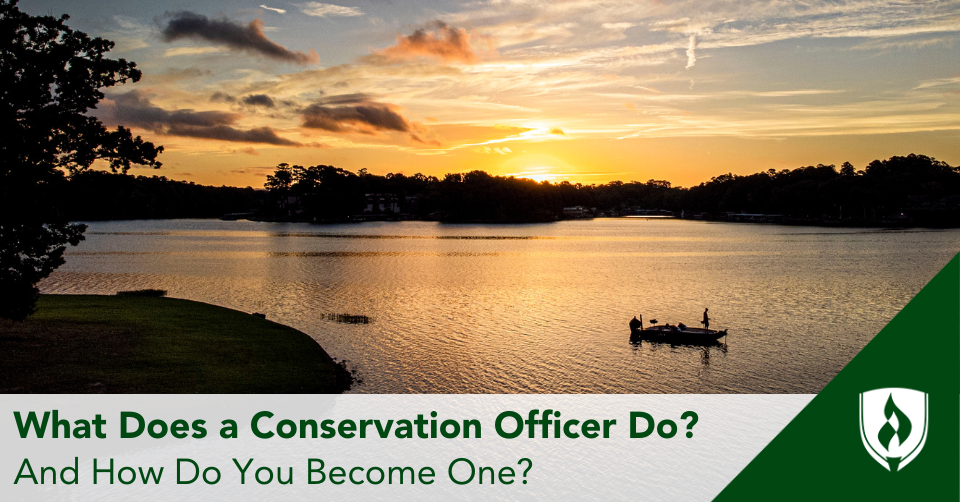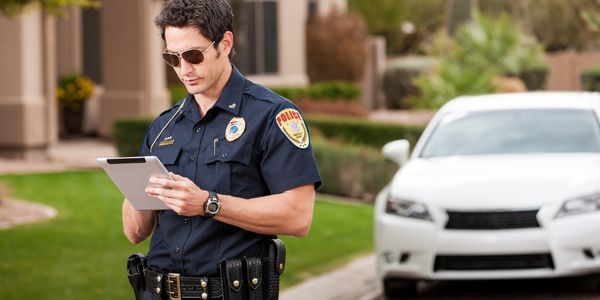
Hiking. Camping. Observing wildlife in its natural habitat. You’ve always found the great outdoors so freeing. So exhilarating. State parks are your home away from home, and if you could spend every waking hour outside, that’s where you’d be—rain or shine.
So now, here you are, planning your next career move, and “conservation officer” has an awfully nice ring to it. With your love of nature, you know as well as anybody that protecting the earth’s resources is so important.
But, how exactly do conservation officers do that? Are there formal education requirements to become a conservation officer? And, how can you be certain this is the right job for you?
We’re breaking down all the details of this rewarding career path. Read on for everything you need to know!
What is a conservation officer and what do they do?
When you hear the words, “criminal justice,” or, “law enforcement,” your mind probably doesn’t go straight to conservation officers. But these professionals also have a duty to uphold the laws to maintain harmony between humans and our natural environment.
Conservation officers are law enforcement officers tasked with preserving natural resources and protecting our public lands. They mainly enforce regulations pertaining to outdoor recreation—think snowmobiling, fishing and off-roading—hunting and even environmental crimes, like littering and dumping.
But, it’s about more than catching lawbreakers and issuing fines. Conservation officers also teach the public about how to interact with nature, safely and responsibly. You might even see conservation officers holding formal classes on subjects like how to safely use firearms, ATVs or snowmobiles.
To understand the legal framework surrounding their work, delve into the realm of environmental law. This article provides insights into what environmental law entails and its significance in preserving our natural world.
Where do conservation officers work, and who hires them?
Conservation officers are state employees. Most states have a Department of Natural Resources (DNR), and that’s who employs conservation officers.
It’s worth noting, though, that some states may designate a different name for this department. For instance, Mississippi has the Mississippi Department of Environmental Quality ( MDEQ), which is their equivalent of a DNR.1
How do conservation officers fit into the world of law enforcement?
As licensed peace officers, conservation officers have all the same law enforcement powers police officers have. In fact, it’s not unheard of for conservation officers to respond to domestic disturbances or other non-environmental emergencies, especially in rural areas.
Most of the time, however, conservation officers focus on wildlife management and outdoor recreation. So, essentially, they have two main priorities: helping people enjoy the outdoors safely and protecting game and fish populations.
How do conservation officers protect wildlife and other natural resources?
Imagine if we all went hunting and fishing every day. It probably wouldn’t be long before animal populations started to shrink, face endangerment or worse, go extinct. That’s what makes wildlife management so important.
There are a number of key players involved in wildlife management. And they all influence how conservation officers do their job. For instance, the DNR’s Fish and Wildlife division tracks and manages aquatic populations that conservation officers help protect.
Wildlife managers and fisheries managers also help by setting regulations for hunting and fishing to ensure these activities remain sustainable, rather than detrimental. If you become a conservation officer, you’ll spend much of your workday patrolling public lands and waterways to enforce these regulations.
How do you become a conservation officer, and what does the hiring process look like?
Education requirements may vary from state to state. In Minnesota, for example, you must have an associate’s degree, at minimum, from a regionally accredited college or university.2,3 Interestingly enough, MN job candidates pursuing conservation officer roles do not currently need to have a degree in any particular discipline.2
Still, it’s worth pointing out that the DNR can change these requirements at any point. So, if your heart’s set on becoming a conservation officer—because how many careers will let you patrol the great outdoors—studying a related discipline (like Criminal Justice or Law Enforcement) can be a practical choice.
The MN DNR also offers two different paths for job applicants to become conservation officers: the Conservation Officer Pre-Employment Education Program (CO PREP) and the Conservation Officer (CO) Traditional Opportunity.
The CO PREP Program provides “applicants with the education requirements necessary to take the MN Peace Officer Standards and Training (POST) exam, which is required to become a licensed peace officer in MN.” Candidates in this program must also complete approximately 22 weeks of training before they can then “[continue] on to the Minnesota DNR Enforcement Conservation Officer Academy.”2
Alternatively, the CO Traditional Opportunity is available for applicants “who are currently MN POST licensed, eligible to be licensed, or will be eligible (documentation will need to be provided) to be licensed by the date specified in the posting.”2
Currently, the selection process consists of the following: “application, written examination, oral board interview, background investigation, medical evaluation, psychological evaluation, and functional capacity exam.”2
This example of the process in Minnesota is fairly typical of other states’ DNR and conservation work—but visit your state’s DNR website and carefully research the requirements in your area to get the full picture.
What are some of the skills a conservation officer needs?
Excellent communication skills are a must for anyone interested in this role. Conservation officers routinely interact with hunters, anglers and other outdoor-enthusiasts—AKA: the general public.
Knowing how to get your message across and ensure you’re understood may sound elementary, but, when you’re working with people, communication is everything.
Conservation officers must also be detail-oriented and well-organized professionals. Part of this law enforcement role involves writing comprehensive reports summarizing interactions with offenders and the ensuing events.
Physical strength should not be overlooked, either. “Being a CO is a physically demanding job that sometimes requires lifting heavy objects and working in all types of weather conditions on a daily basis,” according to the MN DNR.3
Is conservation your calling?
Few things in this world are as precious and vulnerable as our environment. Wildlife populations—whether that’s fish, big game, birds or even plants—need more of us to stand up and protect them from poachers, polluters and unsustainable practices.
Working in conservation isn’t just about punishing wrongdoers; it’s about keeping our communities safe and making sure our planet is still here for future generations. That’s quite the mission! Are you up to the task?
1USLEGALl®, State Department of Natural Resources, (accessed March 2024), State Department of Natural Resources – Natural Resources Law (uslegal.com) “. Also add this registered trademark statement “USLEGAL® is a registered trademark of AIRSLATE LEGAL FORMS, INC.
2MN Department of Natural Resources, Division Enforcement Conservation Officer Applicant Frequently Asked Questions, (accessed March 2024), Conservation Officer Applicant Frequently Asked Questions (state.mn.us)
3MN Department of Natural Resources, Conservation officer careers and hiring information, (accessed March 2024), Conservation officer careers and hiring information | Minnesota DNR (state.mn.us)




